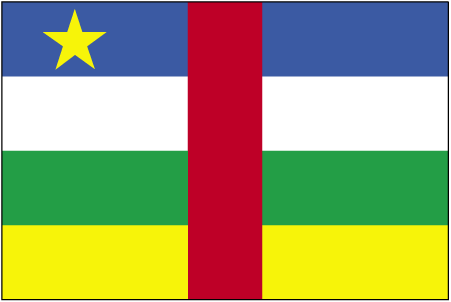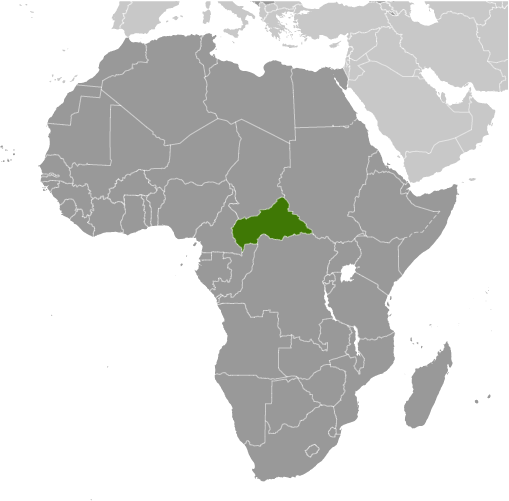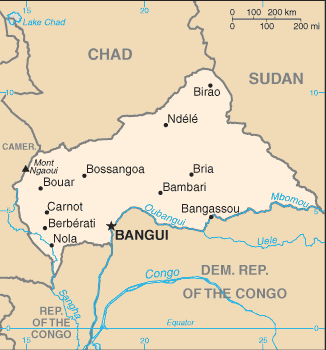The former French colony of Ubangi-Shari became the Central African Republic upon independence in 1960. After three tumultuous decades of misrule - mostly by military governments - civilian rule was established in 1993 and lasted for one decade. President Ange-Felix PATASSE's civilian government was plagued by unrest, and in March 2003 he was deposed in a military coup led by General Francois BOZIZE, who established a transitional government. Though the government has the tacit support of civil society groups and the main parties, a wide field of candidates contested the municipal, legislative, and presidential elections held in March and May of 2005 in which General BOZIZE was affirmed as president. The government still does not fully control the countryside, where pockets of lawlessness persist. Unrest in the neighboring nations of Chad, Sudan, and the DRC continues to affect stability in the Central African Republic as well.
Population
4,844,927
Country comparison to the world:116
note:estimates for this country explicitly take into account the effects of excess mortality due to AIDS; this can result in lower life expectancy, higher infant mortality, higher death rates, lower population growth rates, and changes in the distribution of population by age and sex than would otherwise be expected (July 2010 est.)
Nationality
Noun:Central African(s)
Adjective: Central African
Ethnic groups
Baya 33%, Banda 27%, Mandjia 13%, Sara 10%, Mboum 7%, M'Baka 4%, Yakoma 4%, other 2%
Religions
indigenous beliefs 35%, Protestant 25%, Roman Catholic 25%, Muslim 15%
note: animistic beliefs and practices strongly influence the Christian majority
Languages
French (official), Sangho (lingua franca and national language), tribal languages
Country Name
Conventional long form: Central African Republic
Conventional short form:none
Local long form:Republique Centrafricaine
Local short form:none
Former:Ubangi-Shari, Central African Empire
abbreviation: CAR
Government Type
republic
Capital
Name: Bangui
Geographic coordinates:4 22 N, 18 35 E
Time difference:UTC+1 (6 hours ahead of Washington, DC during Standard Time)
Administrative divisions
14 prefectures (prefectures, singular - prefecture), 2 economic prefectures* (prefectures economiques, singular - prefecture economique), and 1 commune**; Bamingui-Bangoran, Bangui**, Basse-Kotto, Haute-Kotto, Haut-Mbomou, Kemo, Lobaye, Mambere-Kadei, Mbomou, Nana-Grebizi*, Nana-Mambere, Ombella-Mpoko, Ouaka, Ouham, Ouham-Pende, Sangha-Mbaere*, Vakaga
Independence
13 August 1960 (from France)
National Holiday
Republic Day, 1 December (1958)
Constitution
ratified by popular referendum 5 December 2004; effective 27 December 2004
Legal system
based on French law; has not accepted compulsory ICJ jurisdiction
Suffrage
21 years of age; universal
Executive branch
Chief of state: President Francois BOZIZE (since 15 March 2003 coup)
Head of government: Prime Minister Faustin-Archange TOUADERA (since 22 January 2008)
Cabinet:Council of Ministers
(For more information visit the World Leaders website)
Elections:under the new constitution, the president elected for a five-year term (eligible for a second term); elections last held on 13 March and 8 May 2005 (next to be held on 10 May 2010); prime minister appointed by the political party with a parliamentary majority
Election results: Francois BOZIZE elected president; percent of second round balloting - Francois BOZIZE (KNK) 64.6%, Martin ZIGUELE (MLPC) 35.4%
Legislative branch
unicameral National Assembly or Assemblee Nationale (105 seats; members are elected by popular vote to serve five-year terms)
Elections: last held on 13 March 2005 and 8 May 2005 (next to be held in April 2010)
Election results: percent of vote by party - NA; seats by party - KNK 42, MLPC 11, RDC 8, PSD 4, FPP 2, ADP 2, LONDO 1, independents 34, other 1
Judicial branch
Supreme Court or Cour Supreme; Constitutional Court (three judges appointed by the president, three by the president of the National Assembly, and three by fellow judges); Court of Appeal; Criminal Courts; Inferior Courts
Political Parties and Leaders
Alliance for Democracy and Progress or ADP [Jacques MBOLIEDAS]; Central African Democratic Rally or RDC [Andre KOLINGBA]; Civic Forum or FC [Gen. Timothee MALENDOMA]; Democratic Forum for Modernity or FODEM [Charles MASSI]; Liberal Democratic Party or PLD [Nestor KOMBO-NAGUEMON]; Londo Association or LONDO; Movement for Democracy and Development or MDD [David DACKO]; Movement for the Liberation of the Central African People or MLPC [Ange-Felix PATASSE] (the party of deposed president); National Convergence or KNK; National Unity Party or PUN [Jean-Paul NGOUPANDE]; Patriotic Front for Progress or FPP [Abel GOUMBA]; People's Union for the Republic or UPR [Pierre Sammy MAKFOY]; Social Democratic Party or PSD [Enoch LAKOUE]
Political pressure groups and leaders
Monam (combating gender-base violence)
International organization participation
ACCT, ACP, AfDB, AU, BDEAC, CEMAC, FAO, FZ, G-77, IAEA, IBRD, ICAO, ICCt, ICRM, IDA, IFAD, IFC, IFRCS, ILO, IMF, Interpol, IOC, ITSO, ITU, ITUC, MIGA, NAM, OIC (observer), OIF, OPCW, UN, UNCTAD, UNESCO, UNIDO, UNWTO, UPU, WCO, WFTU, WHO, WIPO, WMO, WTO
Diplomatic representation in the US
Chief of mission:Ambassador Stanislas MOUSSA-KEMBE
Chancery:1618 22nd Street NW, Washington, DC 20008
Telephone:[1] (202) 483-7800
FAX:[1] (202) 332-9893
Diplomatic representation from the US
Chief of mission: Ambassador Frederick B. COOK
Embassy:Avenue David Dacko, Bangui
Mailing address:B. P. 924, Bangui
Telephone:[236] 61 02 00
FAX:[236] 61 44 94
note: the embassy is currently operating with a minimal staff
Flag description
four equal horizontal bands of blue (top), white, green, and yellow with a vertical red band in center; a yellow five-pointed star to the hoist side of the blue band; banner combines the Pan-African and French flag colors; red symbolizes the blood spilled in the struggle for independence, blue represents the sky and freedom, white peace and dignity, green hope and faith, and yellow tolerance; the star represents aspiration towards a vibrant future










